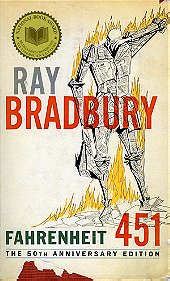I recently re-read this, after initially reading it in high school about 20 years ago.
For those of you needing a description of possibly one of the most popular books (not just science fiction) of our time, here it is (thanks to Neil Roseman and Amazon.Com):
---
In “Fahrenheit 451″, Ray Bradbury’s classic, frightening vision of the future, firemen don’t put out fires - they start them in order to burn books. Bradbury’s vividly painted society holds up the appearance of happiness as the highest goal - a place where trivial information is good, and knowledge and ideas are bad. Fire Captain Beatty explains it this way, “Give the people contests they win by remembering the words to more popular songs…. Don’t give them slippery stuff like philosophy or sociology to tie things up with. That way lies melancholy.”
Guy Montag is a book-burning fireman undergoing a crisis of faith. His wife spends all day with her television “family,” imploring Montag to work harder so that they can afford a fourth TV wall. Their dull, empty life sharply contrasts with that of his next-door neighbor Clarisse, a young girl thrilled by the ideas in books, and more interested in what she can see in the world around her than in the mindless chatter of the tube. When Clarisse disappears mysteriously, Montag is moved to make some changes, and starts hiding books in his home. Eventually, his wife turns him in, and he must answer the call to burn his secret cache of books. After fleeing to avoid arrest, Montag winds up joining an outlaw band of scholars who keep the contents of books in their heads, waiting for the time society will once again need the wisdom of literature.
---
Back when this book was written (early 1950’s), it was highly important. It gave a bleak look at a possible future, with what seemed like more and more censorship. And though I don’t see us making the change to burn books and take away all that leads to melancholy like Captain Beatty says, it is still important. The control of the government seems to grow more everyday. Some of these changes are needed to ensure the safety of citizens. But the underlying message is still strong.
In today’s book reading society, this book is really a novella at best. Which is funny, because originally it was, and expanded to become a novel. And though short in length, the character development and ideals laid down by Bradbury are amazing. So little is written, yet so much is made out of it. There were many scenes that I forgot about, but many other were very clear. The biggest surprise for me to remember was Bradbury’s prose. For a science fiction book, the prose is extraordinary. Bradbury has all the tools that a writer needs, and displays them with ease in this novel.
The key that led me to re-reading this book was my reading of “Shelf Monkey” by Corey Redekop. There are a few references to “Fahrenheit 451″ in it, and I wanted to brush up and see what it really was that grabbed the attention of so many. Though I enjoyed my science fiction class in high school, still being told to read a book can lead to a warped feeling towards it. At the time, our teacher also had us reading stories from Bradbury’s collection titled “The Illustrated Man”, and found myself more interested in it then a novel. But I am glad that I read this again. It was very enlightening. Mostly to the wonders of Bradbury’s works.
9/10
 Login
Login